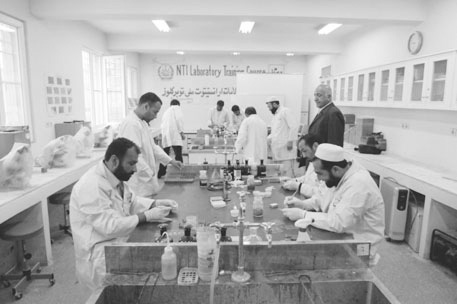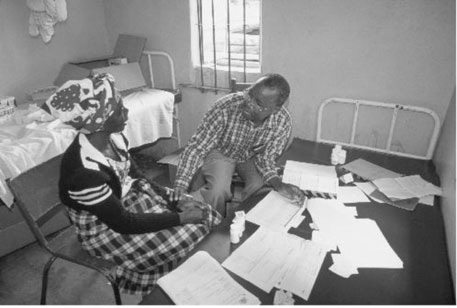Japan's Official Development Assistance White Paper 2010
(2) Infectious Diseases
Infectious diseases such as HIV/AIDS, tuberculosis (TB), and malaria are a major problem not only to individuals, but also to the economic and social development of developing countries. In particular, maladies like super infections of HIV and tuberculosis and multidrug resistant and extensively drug resistant tuberculosis are becoming increasingly severe. In April 2009, there was an outbreak of novel influenza A (H1N1), and there is still a threat of a novel influenza that could emerge from the highly-pathogenic avian influenza (H5N1); strengthening measures against them is a global task. Furthermore, parasitic diseases such as Chagas’ disease, Guinea Worm disease, filariasis, schistosomiasis, and other ”neglected tropical diseases” have infected approximately 1 billion people worldwide, and these diseases are causing major social and economic losses in developing countries. Since infectious diseases have an impact that exceeds national borders in this manner, the international community must address them in unison. Japan closely cooperates with the relevant countries and international agencies in working on countermeasures.
<Japan’s Efforts>
Japan works to address the three major infectious diseases of HIV/AIDS, tuberculosis, and malaria through the Global Fund to Fight AIDS, Tuberculosis and Malaria (the Global Fund), and thus far has contributed US$1.29 billion to the Global Fund. In addition, Japan carries out efforts to promote organic collaboration with its bilateral support in order to ensure that countermeasures for the three major infectious diseases are implemented effectively in developing countries that are supported by the Global Fund.
For tuberculosis, based on the Global Plan to Stop TB 2006 – 2015, Japan supports the implementation and promotion of a series of tuberculosis countermeasures, such as the prevention of infection, early detection, and diagnosis and continuous treatment. This is targeted at countries where the state of proliferation is severe, such as those that the World Health Organization (WHO) has designated as priority tuberculosis countries. In July 2008, five public and private entities announced the Stop TB Japan Action Plan. Based on this Action Plan, these five public and private entities collaborate in working to address tuberculosis countermeasures in developing countries by making use of the experience and technologies that Japan has accumulated through its national tuberculosis program.
For HIV/AIDS countermeasures, Japan raises awareness to prevent new infections and disseminates voluntary counseling and testing services (VCT). It also provides support for the enhancement of distribution systems for AIDS drugs, among its other activities. Efforts like raising awareness on prevention and care and support for infected persons and patients in particular are being vigorously addressed by Japan Overseas Cooperation Volunteers (JOCV) known as AIDS Control Teams, which focus mainly on Africa.
As for malaria, which is one of the major causes of infant mortality, Japan supports initiatives for malaria countermeasures through community enhancement and gives support through its cooperation with the United Nations Children’s Fund (UNICEF). As for influenza, since 2005 Japan has announced international cooperation totaling approximately US$416 million (as of April 2010). Japan provided emergency grant aid of approximately ¥1.1 billion through the WHO in September 2009 in order to carry out immunizations in developing countries with the H1N1 influenza vaccine, which had spread worldwide after originating in North America. In addition, in order to prepare for pandemic influenza, Japan is stockpiling and providing antiviral medicines in cooperation with ASEAN and the Asia-Europe Meeting (ASEM), promoting the raising of awareness and capacity building in collaboration with international agencies like the WHO and UNICEF, and strengthening outbreak surveillance systems through bilateral cooperation. Moreover, as it is important to contain avian influenza epidemics before they reach humans, Japan is providing support for measures to build a cooperative framework to tackle highly pathogenic avian influenza and to promote disease surveillance of wild birds for the Asia-Pacific region through the World Organization for Animal Health (OIE: Office International des Epizooties).
For global polio eradication, Japan supports the provision of polio vaccines through UNICEF to mainly four countries that have been designated as countries of prevalence: Nigeria, India, Afghanistan, and Pakistan. Moreover, in April 2009 a major outbreak was confirmed in Tajikistan and the surrounding countries. In order to deal with this situation, Japan decided to support the provision of US$200,000 worth of polio vaccines through UNICEF.
When it comes to neglected tropical diseases, Japan also takes a leading role in engaging in full-scale measures against Chagas’ disease in Latin America, and contributes to decreasing the risk of infection by supporting the establishment of systems for measures against the vector insect. In regard to filariasis, Japan provides antiparasitic drugs and educational materials and carries out education and prevention activities via JOCVs, and thus aims to achieve a drastic reduction of the number of new patients and maintain its non-epidemic status.
●Afghanistan: Tuberculosis Control Project
In Afghanistan, which is one of the countries with the worst health conditions in the world, infectious diseases constitute the number one cause of death, with tuberculosis accounting for a large proportion. This project, which has been implemented since 2004, aims to improve tuberculosis treatment services. It supports initiatives like strengthening the capacity of the National Tuberculosis Program (NTP) and improving tuberculosis inspection techniques through the dispatch of Japanese experts and the provision of equipment. As a result, the discovery rate for tuberculosis patients has reached 73% and a rate of treatment success of 89% has been achieved, as high quality tuberculosis treatment services are disseminated.

Laboratory technicians undergoing training at the National Tuberculosis Institute in order to improve tuberculosis inspection techniques
●Zambia: Project for Scaling Up of Quality HIV and AIDS Care Service Management
In Zambia, where the rate of HIV infection is high at 14.3% (2007), expanding AIDS treatment known as antiretroviral treatment (ART) and reducing the number of deaths are among the top priorities. Since 2006 Japan has supported the creation of a Mobile ART Model so as to be able to implement ART even in rural areas with limited human and physical resources. This has been done through the Integrated HIV and Care Implementation Project at District Level, a forerunner project (Note 25). By means of excellent access and high quality service the Mobile ART Model has kept the treatment dropout rate low, and has also proven that the Zambian Ministry of Health is capable of providing treatment on its own. Beginning in FY2009 the targeted area was widened for the implementation of the project in an attempt to further expand its results. The expansion of Mobile ART to the entire country through the use of the Global Fund to Fight AIDS, Tuberculosis and Malaria is scheduled for FY2010 onward.

An assistant doctor who periodically makes the rounds from group hospitals every other week to prescribe ART at rural health centers
Notes:
(25) The Integrated HIV and Care Implementation Project at District Level ended in March 2009.
